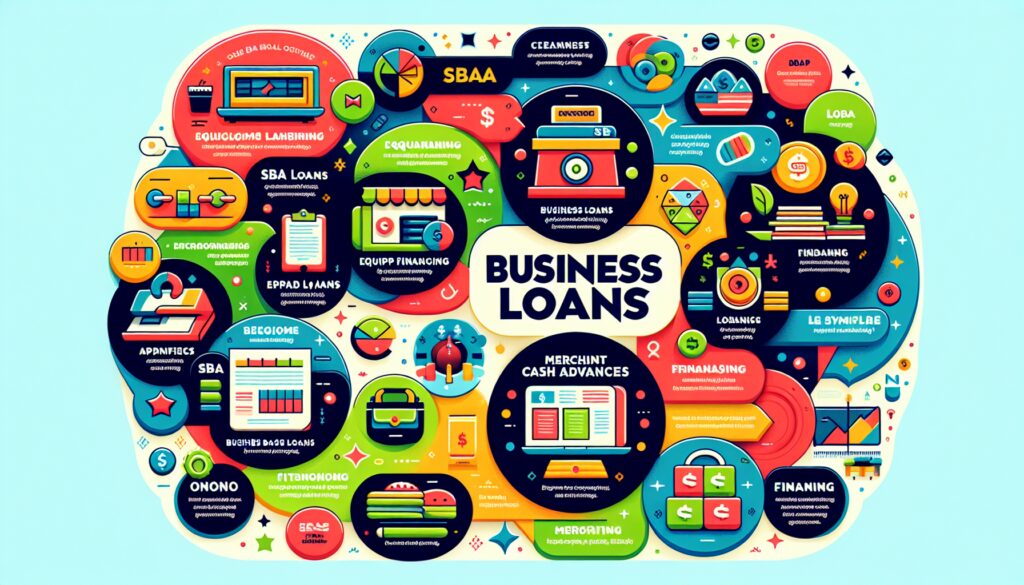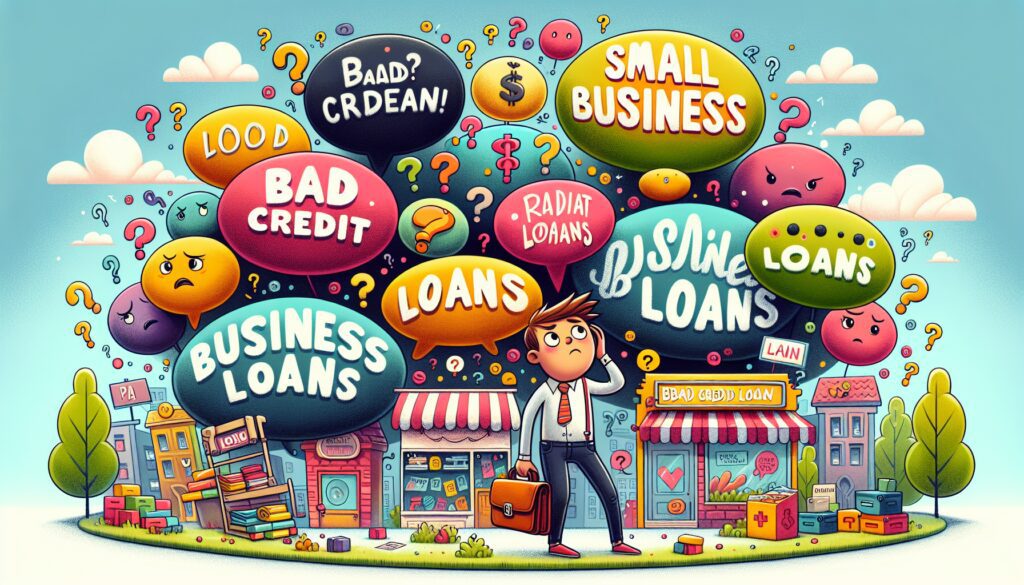The best small business loans and financing options
Do you need the best small business loan for your company? This article covers top options, such as term loans, invoice factoring, and SBA loans, to help you find the perfect fit for your needs.
Key Takeaways
- Small Business loans provide crucial financing options with lower interest rates and favorable terms than personal loans. They cater to various needs, such as expansion and equipment purchases.
- Understanding the different types of small business loans, including term loans, lines of credit, invoice factoring, and Small Business Administration or SBA loans, is essential for selecting the best solution for specific financial goals and circumstances.
- Proper preparation, including maintaining a strong credit score and compiling essential financial documentation, significantly enhances the chances of securing a business loan.
- Traditional bank loans are not available to every company, including startups and those with a bruised personal credit score.
Understanding Business Loans

Securing a business loan is essential for financing expenses such as acquiring new equipment, managing operational costs, or facilitating growth initiatives. By obtaining a small business loan, businesses receive an upfront sum of money they must repay with interest over time.
A small business loan is a form of debt that requires prudent financial management. Such loans play a crucial role by enabling organizations to make substantial investments and manage continuous expenditures—particularly critical for budding enterprises.
One notable benefit of business loans compared to personal loans is their lower interest rates and more appealing repayment conditions. Business loans come in two forms: secured (requiring collateral) and unsecured (dependent on the company’s credit history and rapport with the financier).
Small business loans present flexible options tailored to diverse commercial ambitions, whether bolstering working capital, driving expansion efforts, or investing in real estate property acquisition.
Types of Business Loans

Exploring the array of business loan offerings can seem overwhelming, but a clear grasp of the main types can make it more manageable. An assortment of business loans that cater to diverse funding requirements are available. These include term loans, various lines of credit, invoice factoring, and equipment financing options. Identifying the many loan types on offer aids in pinpointing which one best fits your enterprise’s objectives and fiscal health.
Among the widely used financial solutions are business lines of credit, invoice factoring, equipment financing, and SBA-backed loans. Each category offers advantages tailored for specific purposes, so understanding what sets them apart is essential.
We will delve into specifics regarding term loans, business lines of credit, invoice factoring, and equipment financing Below to elucidate their respective merits and potential uses within a commercial context.
Term Loans
In the realm of business financing, term loans are a fundamental option. They involve receiving an upfront sum, which is repaid, plus interest, over a predetermined duration. These loans deliver a set amount and come with repayment plans that typically extend across several years, offering businesses steadfast support for significant purchases or large-scale expenditures.
Term loan interest rates vary widely from 8% to 30%, contingent upon the lending institution’s terms and the borrowing party’s financial standing. The predictability of fixed monthly payments and stable interest rates allows businesses to strategize their fiscal management more effectively while adhering to their scheduled payment responsibilities.
Functioning as a solid financial mechanism, term loans are instrumental in fostering business growth through acquisitions such as new equipment or covering other substantial costs associated with expansion efforts.
Lines of Credit
A business line of credit furnishes enterprises with adaptable financing options, permitting them to draw funds up to an agreed limit and only incur interest charges on the sum utilized. Such a revolving credit facility is advantageous for multiple withdrawals, repayments, and subsequent usage within a designated timeframe. This instrument serves as a flexible tool in navigating cash flow demands and addressing sporadic outlays.
Lines of credit typically have more favorable interest rates than business credit cards. For instance, Wells Fargo extends lines of credit from $10,000 to $150,000 while offering limits reaching $1 million for businesses with an established track record.
These financial solutions benefit entities dealing with seasonal sales variation or those looking to meet immediate monetary needs without being tied down by rigid monthly payments.
Equipment Financing
Specialized loans, known as equipment financing, are crafted to assist businesses in obtaining the necessary machinery and equipment. Usually collateralized by the actual equipment, these loans tend to come with more favorable interest rates than unsecured business loans.
This financing form is particularly appealing for small businesses that want to invest substantially in their operational assets without draining their cash reserves.
The SBA 504 loan program delivers long-standing fixed-rate funding tailored to acquire significant fixed assets such as real estate. Lenders like QuickBridge and National Funding provide various financial options, including small business loans and equipment financing solutions, catering to diverse business needs.
SBA Loans: A Comprehensive Guide

SBA loans, backed by the Small Business Administration, help fund small businesses by offering partial guarantees to lenders. These loans benefit businesses not qualifying for traditional financing, providing access to necessary capital. SBA small business loans can be used for various purposes, including long-term fixed assets and operating capital.
SBA loans offer competitive rates and fees, longer repayment terms, and lower down payments, making them attractive for small businesses seeking favorable funding.
Eligibility generally requires being a registered business in the U.S. with a valid business purpose and the ability to manage the SBA loan.
SBA 7(a) Loans
Various lenders offer the SBA 7(a) loan program to secure long-term business financing for small businesses. This type of loan is suitable for expanding an enterprise, acquiring new equipment, or refinancing previous debts.
Institutions such as Wells Fargo are known to dispense these loans with average sums near $237,654. This positions them as an effective solution for significant investments in one’s business. The adaptability and availability of SBA 7(a) loans have established them as a fundamental element within small business financing, supporting companies in their pursuit to flourish amidst competitive environments.
SBA Microloans
SBA Microloans are designed for companies that require lower financial support, with a maximum limit of $50,000. They represent one of the best small business loans for new enterprises and smaller businesses looking to cover start-up costs or finance minor projects.
These microloans provide an accessible application procedure and adaptable conditions, which prove beneficial for small businesses at the beginning phases of their expansion.
SBA 504 Loans
SBA 504 loans are designed to offer long-term funding for acquiring fixed assets like real estate and substantial equipment. They focus on aiding small businesses in obtaining vital assets to improve their operations and contribute to economic development.
To qualify for SBA 504 loans, companies must operate as for-profit entities within the United States and adhere to predetermined industry-specific size criteria. These loan funds are restricted primarily to buying or upgrading properties and purchasing machinery, and under some conditions, they may also be used to refinance pre-existing debts.
Given their structured approach and targeted purpose, SBA 504 loans are an instrumental financing option for small businesses planning considerable investment undertakings.
How to Qualify for a Business Loan
Securing a business loan typically hinges on multiple elements, one of the most critical being the borrower’s credit score. While traditional banks might mandate a credit score close to 700 for eligibility, alternative lending institutions may consider lower scores, sometimes down to 500. It’s also vital that businesses show robust financial well-being and prove they can handle the proposed loan amount responsibly.
Thorough preparation is essential to bolster prospects of approval. Crafting an extensive business plan can markedly increase your chances of obtaining financing. Key pieces of financial evidence, such as tax returns, profit and loss statements, and verification of business ownership, are imperative in showcasing preparedness.
Diligently organizing these documents and grasping what is expected can significantly enhance the potential to acquire funding successfully.
Importance of Credit Score
Personal credit scores are pivotal in the loan application process, impacting the likelihood of approval and extended terms. Businesses with higher personal credit scores typically gain access to more advantageous loan rates and conditions.
Despite online lenders employing advanced, data-driven methods for evaluating applications that extend beyond conventional scoring systems, maintaining a robust credit score is still essential to obtaining favorable lending terms.
Bad credit business loans exist, but the terms can be onerous. Invoice factoring may be a better alternative for B2B or B2G businesses.
Preparing a Strong Business Plan
Securing a small business loan heavily depends on presenting a meticulously crafted business plan. This document must detail the company’s objectives, anticipated financial outcomes, and expansion tactics to offer creditors solid insight into the business’s prospective success and reliability.
By conveying the readiness and sustainability of the enterprise through an in-depth business plan, one can considerably improve their likelihood of obtaining loan approval.
Financial Documentation Requirements
Lenders need extensive documentation to evaluate a business’s financial stability and loan repayment capacity. Frequently required records include tax returns, financial statements, and business bank statements. Compiling these documents can facilitate a more manageable loan application process while showcasing the company’s fiscal soundness and trustworthiness.
Best Business Loans for Bad Credit

Small business owners facing credit challenges may find obtaining financing to be a formidable task. Nevertheless, various financial solutions are tailored for businesses with less-than-stellar credit histories, often featuring more accommodating small business loan eligibility.
Alternative funding providers are willing to extend small business loans even to those with credit scores around 500. While these loans come at varied interest rates—ranging from 25% to beyond 99%—they nonetheless offer critical access to funds when most needed.
Businesses with poor credit might also explore alternatives such as merchant cash advances. This form of advance offers upfront capital, which is then paid back via a proportion of forthcoming credit card receipts. Thus, it delivers adaptable repayment structures, albeit frequently accompanied by higher fees.
Online lenders emerge as another feasible avenue, particularly well-suited for small enterprises that have found it challenging to get conventional bank funding due to their bad credit history. These digital platforms typically present fewer barriers in terms of credit score requirements and propose adjustable lending terms that cater more readily to struggling businesses’ needs.
Merchant Cash Advance
Merchant cash advances (MCAs) provide businesses that experience variable income streams with rapid and adaptable financial support. By giving an upfront sum of money to be repaid using a portion of the business’s daily or weekly credit card sales, merchant cash advances match repayments with the company’s actual earnings, thereby circumventing the pressure associated with fixed monthly payments.
Although MCAs present a more expensive borrowing option than conventional loans due to higher costs, they are especially advantageous for companies with seasonal or erratic incomes. These advances facilitate instant funds access without requiring thorough credit investigations or collateral.
Online Lenders
Small businesses, particularly those with less-than-stellar credit histories, increasingly turn to online lenders for small business loans. These digital financiers offer adjustable terms and utilize advanced data analysis beyond conventional credit score metrics. Enterprises such as Bluevine stand out in this market by providing business lines of credit at attractive starting APRs of 7.8%, coupled with rapid funding accessibility.
Such convenience and tolerance render these online lending options especially appealing for companies seeking fast financial arrangements.
Comparing Top Business Loan Providers
Securing favorable loan terms and a hassle-free borrowing process hinges on selecting the appropriate lender. It’s important to evaluate lenders on multiple aspects, such as the specifics of the loans, interest rates charged, repayment schedules, fees involved, rankings in customer service, and availability of products offered. Diverse lending options are available from various sources, including online lenders, credit unions, and traditional banks. Each comes with its own set of strengths and potential drawbacks according to these factors.
Prominent financial institutions like American Express offer up to $250,000 small business loans. On the other hand, Bank of America offers discounts on loan rates alongside complimentary monitoring services for your credit score. To make an informed decision about which provider aligns best with your company’s requirements, it is crucial to grasp these distinctive offerings along with borrower benefits and tools for customer assistance that they bring forth.
Traditional Banks vs. Online Lenders
Both traditional banks and online lenders facilitate small business loans, each presenting unique benefits. Traditional banks cater to established businesses with robust financial histories and good credit ratings, offering stability and more favorable interest rates. The downside is their requirement for extensive paperwork and a documented history of revenue, which can pose challenges for new enterprises.
In contrast, online lenders present alternative financing avenues with greater flexibility and easier access. They frequently enable prospective borrowers to check eligibility through prequalification processes that don’t adversely affect their credit scores. Entities such as OnDeck simplify obtaining term loans or establishing lines of credit by streamlining the application procedures while also ensuring faster fund disbursement—qualities particularly attractive to small businesses in search of prompt and adaptable funding solutions.
Credit Unions
Offering a community-centric approach and more attractive interest rates, credit unions stand out as an appealing alternative to traditional banks and online lenders for securing business loans. Their personalized service and local support often make them a preferred choice for businesses seeking financial assistance.
This combination of competitive rates and robust community support is crucial in nurturing business expansion and ensuring economic stability.
Alternative Funding Options

Small businesses can explore alternative funding methods beyond conventional loans, such as crowdfunding, invoice factoring, and business grants. Crowdfunding sites like Kickstarter enable companies to gather capital from a broad audience in return for rewards or products instead of monetary returns.
Invoice factoring generates immediate cash flow by selling off the company’s accounts receivable at a reduced rate to an external party. This option does not result in new debt like small business loans.
Small businesses may seek financial support through business grants from private organizations or nonprofits. Although there’s significant competition for these funds, securing them requires extensive research into their application procedures. Investigating these alternatives could lead to inventive and viable options for acquiring necessary financing.
Invoice Factoring
A financing approach known as invoice factoring involves companies selling their outstanding invoices to a third-party factoring firm at reduced prices in exchange for instant liquidity. Employing this tactic facilitates an immediate enhancement in cash flow and increases working capital without the burden of new debt.
In common practice, businesses secure an upfront payment ranging from 70% to 90% of the total value of the invoiced amount. This advance assists them in better regulating their cash flow, mainly when income is inconsistent.
One plus of invoice factoring versus a merchant cash advance or a term loan is that factoring is a growing permanent working capital solution. As your sales and accounts receivable grow, so does your permanent availability within your invoice factoring facility. Funds are wired into your business bank account the same day you invoice your customers.
Crowdfunding
Crowdfunding involves collecting modest sums of money from many individuals, typically through internet-based platforms. Contributors frequently anticipate receiving a product or benefit rather than monetary profits for their contribution.
Websites like Kiva integrate crowdfunding with peer-to-peer lending by providing small businesses with loans that do not accrue interest. Fueled by community support, this method can generate funding while fostering a dedicated customer base.
Business Grants
Funding sources such as business grants are coveted for their non-repayable nature. Governmental programs, private entities, or nonprofit organizations frequently offer them, and fierce competition exists.
Enhancing the likelihood of obtaining a grant involves meticulous research to pinpoint appropriate grants while fully comprehending the unique stipulations of the application process. If successful in securing a grant, businesses can receive considerable financial aid without increasing their debt load.
Steps to Apply for a Business Loan
Being well-prepared and knowledgeable about what is required is essential to facilitating the business loan application process. Begin by researching and evaluating different loan options from various lenders, seeking out the most advantageous terms and interest rates for your needs. Once you have assembled all necessary documentation, contact banks, credit unions, or online lenders to initiate the application.
Following approval for a business loan, collaborate closely with a finance professional to scrutinize the details of the proposed offer. This review should concentrate on verifying that both interest rates and repayment plans align suitably with your company’s financial requirements. Companies can efficiently obtain favorable financing arrangements tailored to their needs by conducting thorough preparations and comparing potential offers.
Choosing the Right Loan Type
When choosing the right business loan, it’s essential to assess your particular requirements for your enterprise and seek to reduce expenses such as annual percentage rates (APR), origination fees, and settlement charges. Consider if a short-term business loan or one without early repayment penalties would be better suited for swift payback.
It is vital to guarantee that the amount of money you borrow matches your financial objectives and ability to repay. Doing so is key to preserving your business’s financial health.
Finding the Best Lender
Thoroughly investigating lenders can significantly influence your lending journey. It’s vital to scrutinize customer service offerings, interest rates, and the terms they propose to identify the most suitable option for your enterprise. Comprehending each lender’s distinct benefits and support instruments is crucial to choosing an entity that aligns with your requirements and presents the most advantageous loan conditions.
Startup business loans are available for those needing working capital loans. Again, invoice factoring is very start-up-friendly if you are a B2B business. The minimum annual revenue requirement is low for factoring, too.
Application Checklist
When applying for a business loan, it’s essential to compile key documents lenders typically ask for. These include your tax returns, financial statements, business bank statements, and an in-depth business plan. Presenting complete and accurate documentation will help make the application process more efficient and increase your chances of securing the loan.
Summary
Securing the ideal business loan necessitates recognizing available loan options, comprehending eligibility criteria, and considering alternative financing sources. To obtain advantageous loan conditions and gain the essential capital for your company’s expansion and stability, you should meticulously assess your business’s requirements and conduct an exhaustive investigation of potential lenders. Keep in mind that being prepared is crucial.
Having a comprehensive business plan ready, along with all necessary documents, will improve your prospects of getting approved. Move forward with assurance, knowing that suitable financial resources are attainable for your enterprise’s success.
Frequently Asked Questions
What is the minimum credit score required for a small business loan?
Traditional banks require a minimum credit score of around 700 for a small business loan, although some lenders may approve business loans with low minimum credit score starting at 500.
It is crucial to verify the exact credit score requirements with each lender, as each may have its specific criteria.
What are SBA 7(a) loans used for?
SBA 7(a) loans are versatile and can be used for business expansion, purchasing equipment, or refinancing existing debt. They provide essential funding to support the growth and sustainability of your business.
How do merchant cash advances work?
Merchant cash advances offer a lump sum repaid by taking a percentage of your daily or weekly credit card sales. They provide flexibility but typically at a higher cost.
Considering these costs is essential when deciding if this option suits your business needs.
What documentation is required for a business loan application?
To effectively secure a business loan, you need your tax returns, financial statements, including business bank statements, and a meticulously crafted business plan.
Having these documents prepared in advance will expedite the process of applying for the loan.
What are the benefits of crowdfunding for business funding?
Crowdfunding benefits businesses by enabling them to raise capital from diverse people, fostering customer loyalty, and avoiding debt. This approach secures necessary funding and validates market demand for products or services.
